[[post.title]]
Aug 10, 2023

What speakers fit my car?
What type of car speakers have you got now? What kind of setup do you want? What's your budget?
There are no quick and easy answers to all these questions, except the last one ;)... Improving your car audio system is a complex task, and there are a lot of variables in that process.
This article will take you through the process of finding out what speakers fit your car, as well as:
How many speakers are in your car
Picking the best speakers for your car
Getting the best from your car speaker system
In this article, we’ll focus on upgrading your speaker system yourself in a DIY/plug & play manner, with no drilling, soldering or fabrication required.
Let’s dive in.

The type of speakers used in most BMW’s and MINI’s audio systems are very similar to each other 90% of the time. It’s the 10% of exceptions that can ruin your day when you order “upgraded” speakers online from a company that isn’t as laser beam focused as we are on exact details. You could be challenged by incompatible connectors, missing wiring, too deep speakers or various woofer impedance choices. The devil lies in the details, so how do you navigate all this on your own?

As mentioned earlier, your exact vehicle specification will profoundly impact the type of speakers that will be suitable to you.
Here are several things to consider when choosing a car audio speaker:
Pro tip: No matter what speakers you choose for your car, be sure to test them out with these songs.
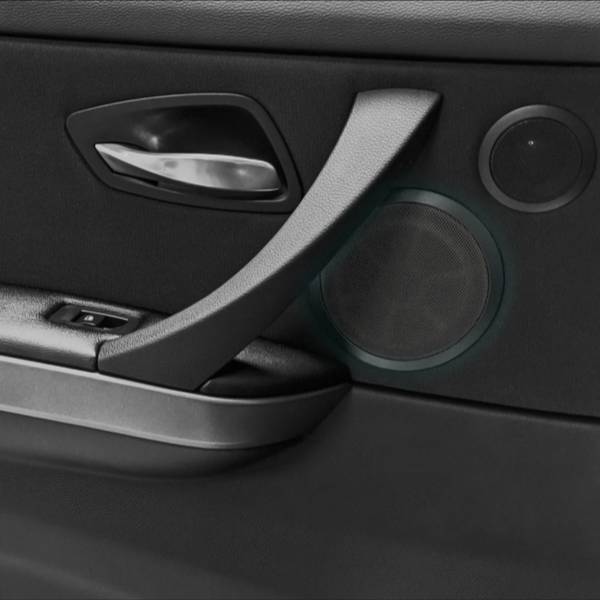
The very first step to start with upgrading your car is to know and understand what audio system your car came with from the factory. This will give you a good idea of the foundation on which you’re going to improve.
The easiest way to find out "what speakers fit in my car" and how many there are is to simply look... But how much fun would it be to take apart your BMW or MINI just to understand what speakers your car has and where? When choosing speakers with our BimmerTech online store by typing in your vehicle VIN, you’ll be presented with the exact type and amount of speakers that we offer for your car. If custom adapters are required – we include them with your speaker order, no questions asked, so you don’t have to reinvent the wheel all on your own.
As an example we have a detailed blog about the different BMW G20 3-series audio systems, coming with anything from 6 to 16 car speakers.
In most popular BMW’s and MINI’s the shape and size of the respective woofer, midrange and tweeters used to build the various car audio systems are almost all the same. Of course the technical specifications and build materials differ greatly between for example a HiFi midrange with a paper cone compared to a B&W midrange with an aramid fiber cone.
On the other hand the woofer cone in base stereo BMW’s is much smaller in diameter than the woofer cone of HiFi equipped BMW’s while the size and shape of the speaker basket is the same for both.
However, in some rare cases a specific BMW chassis has uncommon size and shape speakers like oval kick-bass speakers in i3’s or woofers in base stereo E89 Z4’s that look exactly like every other under seat woofer in any BMW and MINI but are in fact a scaled down version and you really can’t tell by just looking at them. In these odd cases we just don’t offer upgraded speakers.
Alpha One speaker sizes are as follows:
| Speaker Model | Speaker Size |
| A90 Underseat Woofer | 229 mm (9”) |
| A45 Midrange Speaker | 100 mm (4”) |
| A40 Midrange Speaker | 100 mm (4”) |
| A10 Tweeter | 25 mm (1”) |
What do you need to know about speaker impedance in BMW’s? The most important thing is that you need to use woofers with the correct impedance for your car.
Practically all BMW and MINI midrange and tweeters have a nominal impedance of 4 Ohms so it’s hard to get anything wrong here. OEM woofers on the other hand come in 2,4 and 8 Ohm versions depending on the factory audio system. As a rule of thumb during the last 10 years base stereo equipped vehicles had 4 Ohm woofers, HiFi 676 and HK 674 had 2 Ohm units and all the higher end systems starting with 677 HiFi Professional, through Harman Kardon 688, B&O, B&W, Individual would have 7 or 8 Ohm nominal impedance woofers. The difference between 7 and 8 ohm woofers is marginal, so they can be used interchangeably.
Once again thanks to the fact that we know everything BMW we programmed our Alpha One Speakers page to recommend you the correct impedance woofers for your car.
The only case where we would be recommending woofers of different than OEM impedance for your car is when you are retrofitting our Alpha One Amp into your originally base stereo car and upgrading all of the speakers along with it. In this case our page will recommend 2 Ohm woofers. However, if you upgraded the speakers in a base stereo car using 4 Ohm A90 woofers before retrofitting our Alpha One Amp it’s no big deal. Our amp has plenty of power reserves to drive them just as well as it would 2 Ohm woofers. All it needs is a different tuning file for 4 Ohm woofers.
What will happen if you get the woofer impedance wrong?
We have heard of many cases where an enthusiast would have a HiFi 676 equipped Bimmer, sourced a full set of speakers removed from a 688 Harman Kardon vehicle and proceeded to replace as many speakers as possible for seemingly their more premium counterparts. As soon as they were finished they would find there was no bass. Perhaps the woofers were broken? Nope. The woofers were simply playing so quietly, that they were not audible. In this scenario nothing gets broken. The factory amp is simply not suited to deliver sufficient power to the woofers as 8 Ohm woofers require an amplifier capable of delivering a lot higher voltage than the HiFi amp can deliver. 2 Ohm woofers don’t need as much voltage as they draw a lot of current from the HiFi amp which it can deliver.
What happens if you install 2 or 4 Ohm woofers into a Harman Kardon equipped vehicle? We haven’t tried that yet and we don’t recommend checking. In this case the amplifier is not suited to drive low impedance woofers. They will be drawing a lot more current from the Harman amplifier than it was designed for and as a result will sound much louder than the correct (higher) impedance woofers drowning out the mids and tweeters but only to the point, where the amp will run out of steam and start getting strained. You could expect the amp’s overcurrent protection circuitry to kick in. You could even blow out the woofers. In any case it would sound so bad, that anyone with common sense would immediately know something is wrong and it would hopefully turn down the volume and take a break and troubleshoot.
Check how to upgrade Harman Kardon speakers with BimmerTech speaker upgrades.
This topic of speaker power handling should be pretty straightforward right? It should be just a number expressed in Watts and that’s all folks, curtains down! For some reason it ends up being more complicated than that.
The main reason for the complications is that quite commonly both big and small manufacturers of car speakers will “puff up their hog” with inflated power handling numbers making it difficult to find out the actual speaker power handling specs if there still is such a parameter out there…
Power handling should tell you how much power (measured in Watts) a car audio speaker can receive from audio output and safely transform it into audible music. Depending on the exact factory audio system the power could be coming from just a radio head unit in the dash or a big and beefy multichannel beast of an amp like in B&W equipped BMW’s. Factory audio systems will usually have speakers that are closely matched to the amplifier's power output. Manufacturers don’t want you to be able to blow a speaker when you have the volume turned all the way up.
RMS (Root mean square) power handling specs are what is most important to find out as RMS power handling tells you how much power a speaker can handle continuously safely and without distortion when driven with an impeccably clean source signal. This is the gold standard of expressing power handling specs when measured honestly and accurately in a controlled measurement environment. The world would have been a better place if everyone would have adhered to this standard. Just like in the civilized world where we use kilograms and meters instead of measuring in human feet and pounds – who still does that? ;) Oftentimes you will come across speaker power specs that don’t say whether it’s RMS power or anything at all. In such cases you could be looking at a max or peak power rating. What are those you may ask?
A max/peak power handling rating lets you know how much power a speaker can handle in a very short period of time without sustaining damage. Shady manufacturers will often not only inflate their RMS power handling specs or not publish them at all and instead quote pie in the sky max power ratings that are 4 times as much as their actual RMS power handling specifications would be. You shouldn’t consider touching such speakers with a 6 foot pole if you can avoid doing so.
Full technical specifications for factory speakers used in BMW’s and MINI’s are not publicly available. You will always find a sticker with the part number on an OEM speaker, sometimes also including the nominal impedance, but you won’t find any power ratings printed on them. In technical documents you can find some information about their power ratings but you won’t find out if they are for RMS or MAX power. As an example the published power ratings for a G12 7-Series with a HiFi Audio system is 25W for both the tweeters and midranges and 40W for the woofers.
Alpha One speaker power handling specs:
| Speaker Model | RMS Power | Max Power |
| A90 Underseat Woofer | 50W | 100W |
| A40 & A45 Midrange | 25W | 50W |
| A10 Tweeter | 15W | 30W |
Does a speaker's power handling tell you how loud the audio system will go? Not really as that will depend on their power handling, the available power from the amp driving them and finally their sensitivity.
Car speaker sensitivity is a measurement of how much sound pressure level a speaker can generate with 1W of power. During the measurement a calibrated microphone is placed 1 meter away from the car speaker. Manufacturers perform such measurements in anechoic chambers for accurate results. Sensitivity is expressed in dB or decibels which is the unit used for expressing sound pressure level (SPL).
How does speaker sensitivity matter in a car audio system? A high sensitivity car speaker will be able to produce more sound output/volume than a lower sensitivity car speaker with the same amount of input power.
When you compare a speaker that has 87dB sensitivity to one that has 90dB sensitivity – you might be surprised to find out it takes twice as much power e.g 2 Watts to drive the 87dB speaker to 90dB of sound pressure while the 90dB speaker will only need one Watt. By principle it takes double the power to increase the SPL generated by a speaker by 3dB.
If you have a low powered head unit in your BMW without an amplifier it would be of benefit to have sensitive speakers connected to it so that they can efficiently convert the limited amount of power that they receive into actual sound. On the other hand if you have a decently or high powered amp driving the speakers, it will no longer be as important for the car speakers to be sensitive but they will need to be able to handle the additional power needed to get them to a sensible volume level.
It’s quite a balancing act to make a good speaker that is both sensitive, with a desirable in-car frequency response and able to handle reasonable to large amounts of power all for the ultimate purpose of achieving high quality and loud playback volumes. We put a lot of effort into getting the balance just right in our Alpha One speakers and that is much more important than to only chase power handling or sensitivity numbers with reckless disregard for how a complete set of speakers sounds and performs in a variety of cars and audio systems.
Alpha One Speaker Sensitivity Chart:
| Speaker Model | Speaker Impedance | Sensitivity |
| A90 Woofer | 2 & 7 Ohm | 89dB |
| A90 Woofer | 4 Ohm | 90dB |
| A40 & A45 Midrange | 4 Ohm | 88dB |
| A10 Tweeter | 4 Ohm | 85dB |
Combining everything together
At this point it would be reasonable to answer the question how important is a speaker’s power handling and what does it tell you about a speaker’s potential performance?
When it comes to the volume/loudness in layman's terms, or more accurately maximum possible sound pressure level (SPL), that a speaker system will make in a car – this will be a result of a combination of the speakers individual power handling, their sensitivity and the amount of clean power that it can be delivered to them from the amplifier or head unit.
There is no point in chasing incredibly high SPL numbers unless you want to suffer hearing loss. With the combination of our Alpha One speakers and Amplifier we can achieve SPL levels that get uncomfortable to listen to for longer than 5 minutes. No detailed calculations are required. Exposure to sound pressure levels of over 85dB for prolonged periods of time can already cause hearing loss and our woofers need only 1 watt of power to achieve a sound pressure level of 90dB. Thanks to this they perform great in BMW’s and Mini’s equipped with a factory amplifier and can really shine when paired with our Alpha One Amp thanks to the extra DSP processing that can be done with it.

There are many different types of car speakers that you can install into your vehicle.
It's important to remember that there's no one single 'perfect' setup. You can have the best car audio speakers, but if they're not matched to your car or set up correctly, it won't sound like it should.
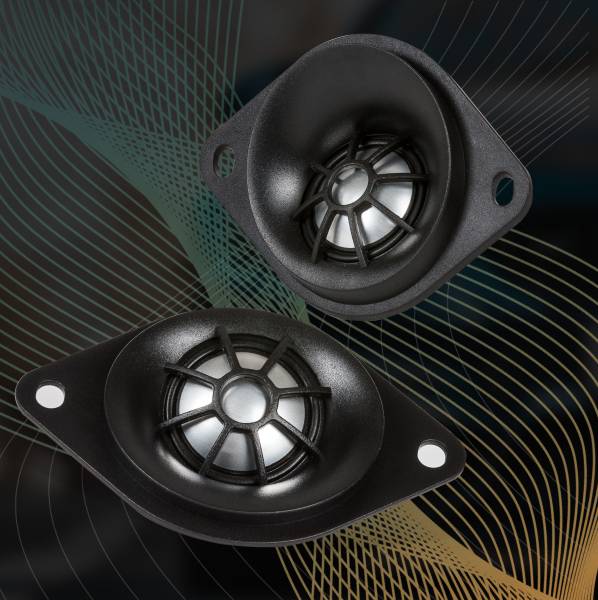
A car tweeter speaker is a speaker that's designed to recreate high frequencies, usually over 4KHz. Generally smaller than 2 inches in diameter when part of a component system, they're commonly mounted in the A-pillar, doors, dashboard or even D-pillars and rear shelf.
Not all car audio systems come with tweeters. For example, many BMW models with base-level systems don’t have them. As always there are further exceptions here and there with for example F22/23/87 2-Series not having tweeters despite having the HiFi 676 option.
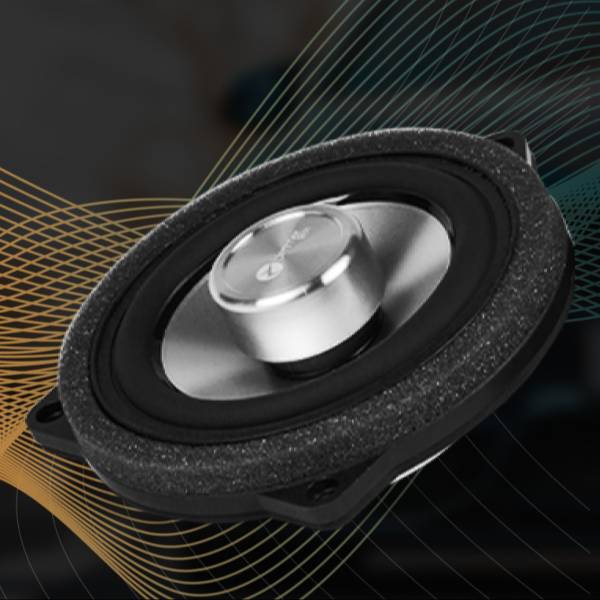 A midrange speaker, or woofer, recreates the midrange frequencies, generally between 100Hz and 10KHz. It's at these frequencies that most of the music 'happens.' The human voice and most instruments create frequencies in this spectrum. These speakers are usually mounted in the doors, D-pillars, rear shelf or even the roof in BMW’s.
A midrange speaker, or woofer, recreates the midrange frequencies, generally between 100Hz and 10KHz. It's at these frequencies that most of the music 'happens.' The human voice and most instruments create frequencies in this spectrum. These speakers are usually mounted in the doors, D-pillars, rear shelf or even the roof in BMW’s.
You can use either term to describe the biggest factory car speakers mounted in BMW’s and MINI’s used to reproduce the lowest audio frequencies. Most of the time they’re mounted under the front seats. It seems calling them car subwoofers seems to roll off everyone's tongues most easily. By no means could you compare them to the kind of subwoofer that gets mounted in your car's trunk though. 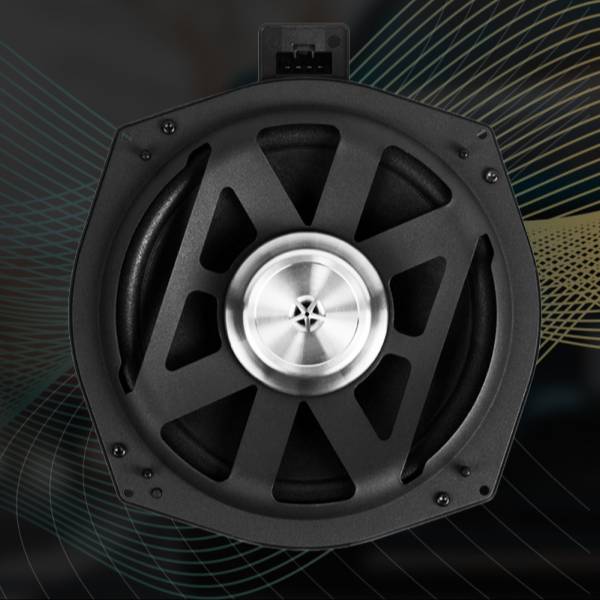 Typically when you think of a car subwoofer it would be a 8-18” speaker inside a big and sturdy enclosure capable of rattling the glassware in your neighbor's kitchen cabinets when turned up. You’ve probably seen videos of people terrorizing fast-food chain drive through employees with such equipment. For that reason we try to stick to calling them woofers or under-seat woofers in the context of BMW’s.
Typically when you think of a car subwoofer it would be a 8-18” speaker inside a big and sturdy enclosure capable of rattling the glassware in your neighbor's kitchen cabinets when turned up. You’ve probably seen videos of people terrorizing fast-food chain drive through employees with such equipment. For that reason we try to stick to calling them woofers or under-seat woofers in the context of BMW’s.
Woofers are usually tasked with reproducing frequencies below 200Hz. They’re the most power hungry car speakers along with subwoofers. A fun fact about woofers in BMW’s is that they’re usually mounted in a housing not much bigger than the speaker itself which gets sealed up against an opening in the unibody chassis to expand the volume of the enclosure in which the speaker carries out its duties. As a result, on some BMW’s with our Alpha One woofers installed the side skirt covers start rattling from the additional pressure and vibration. You can’t hear it on the inside so it’s all good ;)

What should you upgrade first? The amp or speakers? The “rules” of order by which we recommend upgrading your system depend on your factory audio system option and even the iDrive version. It's fairly difficult to explain all of the details in a nutshell, but the basic principles by which we make our upgrade recommendations are easy enough to understand.
If you have a base stereo system vehicle with no tweeters – you really need to retrofit our amp and at least a set of front speakers consisting of tweeters, midranges and underseat woofers. Needless to say it would be better to replace all of the speakers including the rear ones if your budget can handle that. The factory ones are just no good. Just like the audio signal source without a factory amp.
Could you start off with the speakers and add the amp later? You could and the sound will be greatly enhanced but only to the point where the factory audio source will run out of power and that happens quickly. On the factory speakers the lack of power isn’t that apparent. Good quality speakers like our Alpha Ones will not be able to perform to their fullest potential without an amp as a distorted and clipped input signal from the factory audio source will ruin your listening experience when you try to turn up the volume. Somewhere above 50% volume, without an amp base stereo equipped cars run out of steam. Our recommendation is firm: either do it all or don’t do it at all.
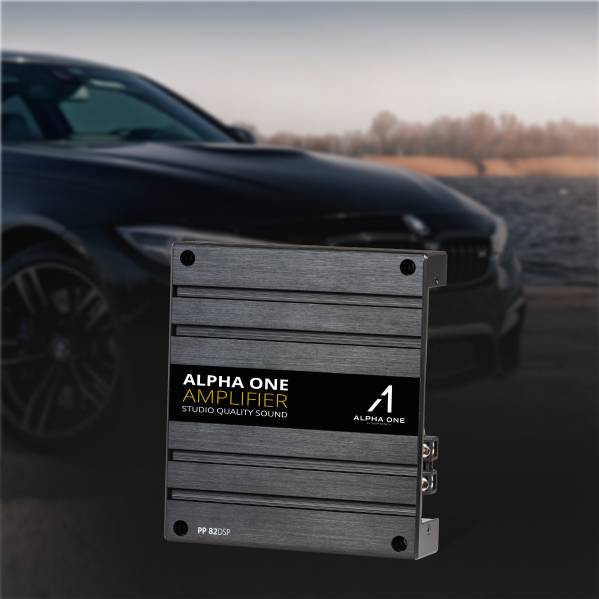 If you have a HiFi 676 or HK 674 car – the factory speakers are decent enough that we can unlock their hidden potential with just the amp thanks to the DSP tuning which we pre-load to our amps. (It can be changed later once you decide to get the speakers replaced ;) ) In these cars you get a terrific bang for your buck by upgrading just the amp even without Alpha One speakers. This is much more budget friendly than having to take the plunge for an amp and speakers like with base stereo BMW’s and MINI’s.
If you have a HiFi 676 or HK 674 car – the factory speakers are decent enough that we can unlock their hidden potential with just the amp thanks to the DSP tuning which we pre-load to our amps. (It can be changed later once you decide to get the speakers replaced ;) ) In these cars you get a terrific bang for your buck by upgrading just the amp even without Alpha One speakers. This is much more budget friendly than having to take the plunge for an amp and speakers like with base stereo BMW’s and MINI’s.
The factory speakers still have limits in the amount of clarity, presence and bass that they can deliver regardless of our tailor made DSP profiles for OEM speakers. DSP processing is not magic. Like with engine tuning you can squeeze much more with a ECU flash from a 3 liter turbo B58 than you can from a 2 liter B48. We can re-shape the frequency response, increase the volume by delivering a little more clean power but only within the limits of the factory speakers power handling specs. Our amp could burn up the HiFi speaker voice coils in an instant if we were to turn the gain up sending too much power to the speakers. With our Alpha One speakers we don’t have to push them around with EQ as much as the OEM speakers, so right from the get go they sound better with less EQ, and the cherry on top is that they can handle more power than the OEM HiFi speakers. Of course we have a different DSP profile for them.
Look at it this way – owners of base stereo cars have to do the amp and speakers in one go anyway, so why not treat yourself with a completely transformed musical experience instead of only picking the low hanging fruit?
If you have a Harman Kardon or other iteration of Hifi Professional 677 or 688 audio system, the factory amps in these cars are already pretty powerful and even decently tuned. However, this doesn’t mean things can’t get any better. Our Alpha One amplifier is much more powerful than the one that comes stock with these options – the combined max output of 1680W for all channels trumps the 464W of the factory-installed amp.
When it comes to speakers, they are pretty good too, but they do tend to sound over the top harsh in the mid and high frequencies. The bass, on the other hand, while powerful, lacks some low-end extension. In this instance, Alpha One speakers come to the rescue by smoothing out the mids and highs with no loss of clarity, while our woofers significantly improve the low end response with extra extension and a cleaner kick-bass punch.

As you’ll find on our Speakers and Amplifier upgrade page we offer a variety of speaker upgrade packages. A complete set of available speakers for any given BMW chassis is the best option that we have to offer. Obviously.
A more budget friendly option is the front & woofer set of speakers, which while it does not go the full 9 yards like the complete set does – this package still has everything you need for great stereo playback. Similarly to a set of high end full size floorstanding home stereo speakers.
Lastly – if you’re only after improving the bass response with deeper low end extension and cleaner kick-bass and some more volume than on the factory woofers – this upgrade will be perfect for you.
We don’t offer packages consisting of only midrange and tweeter sets as a set as they will not sound great when paired with OEM woofers. We purposefully designed our speakers to perform great as a full set, front and woofer set or woofers only upgrade. Obviously you can order a set of mids and tweeters for the front or all around, but we only recommend doing this if you already have our upgraded Alpha One woofers.
Please, don’t even think about adding our tweeters only to a base stereo BMW or MINI. That’s just not a plan.

If you drive a BMW or MINI, BimmerTech's Alpha One car speaker system will give you the best bang for your buck. Using designs that are plug and play bolt on upgrades with just the right frequency response, high sensitivity woofers and good power handling, your car's audio experience will take you from tapping your foot to being unable to wipe that smile off your face. Our website will always recommend the correct speakers for your car and if you have any questions – our advisors are always just a few clicks or a phone call away.

Upgrading your BMW’s or MINI’s speakers is going to be a breeze if you decide to go with Alpha One speakers using the proprietary VIN based tool for making your order. We know BMW’s multimedia systems through and through and keep expanding our range of turn-key audio upgrade solutions with every passing month. Just look at our reviews and YouTube videos to get a full picture of the dedication we put into making your BMW sound just right.
Customer Reviews
Comments
Rate the product
This email is already registered.
Please Log In to continue.
Categories:
[[cat.label]] ([[cat.data.length]])Popular posts:
Newsletter
Customer Reviews
Comments
Rate the product
This email is already registered.
Please Log In to continue.
[[comment.name]]
[[comment.text|raw]]
BimmerTech
Newsletter
[[comment.name]]
[[comment.text|raw]]
BimmerTech